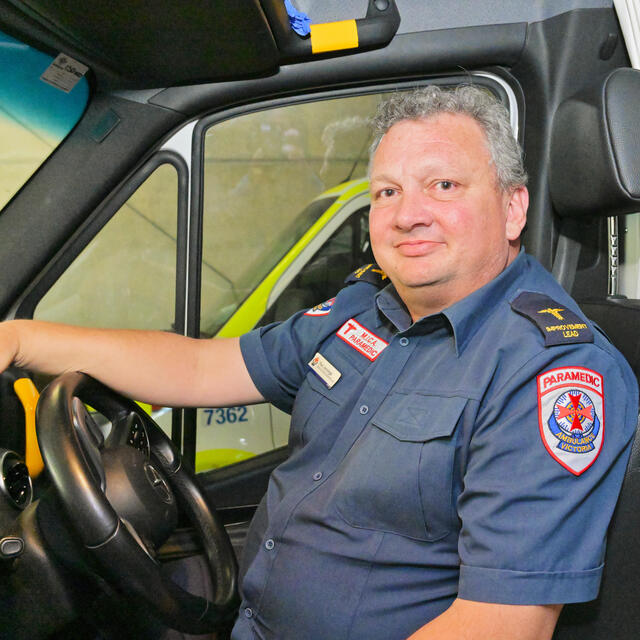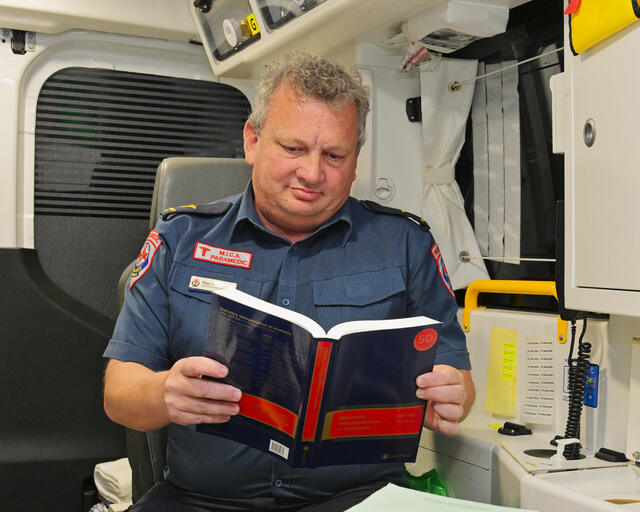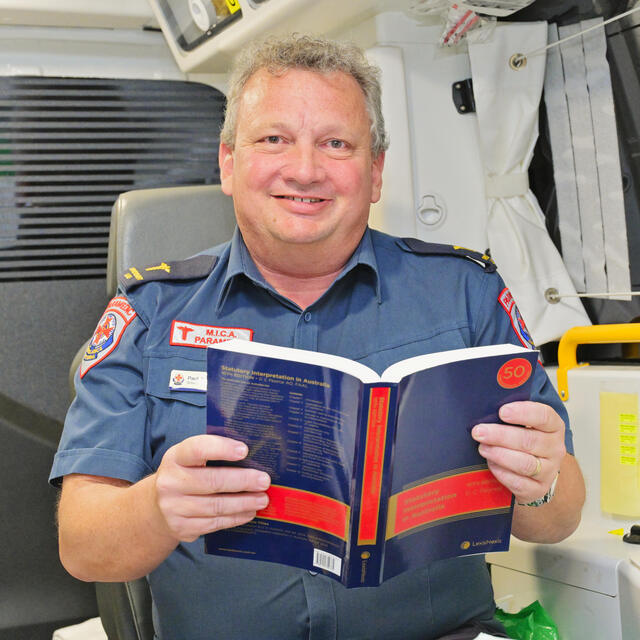Ambulance Victoria Barwon South West regional improvement lead Paul Jennings speaks with Jena Carr as he celebrates a significant career milestone following his admission to the Supreme Court of Victoria as an Australian lawyer.
Paul Jennings, 51, has spent most of his life in and around the medical field, with his interest sparked at a young age.
The qualified mobile intensive care ambulance paramedic living in Little River and working in Belmont started his career in the health service as a child.
“My father was a seafarer and one of his roles, whilst he wasn’t trained in advanced first-aid, he was the person that would provide first aid on the ship,” he said.
“I used to love going on the ship with him, and he’d take me into the infirmary. I’d see the infirmary with all its gear, bandages, first-aid books, and all sorts of things.
“I was enrolled with St John Ambulance (first-aid youth program) from when I was nine years old and it was probably because of that interest in first-aid and everything that I pursued the health industry.”
Paul was a registered nurse working in an emergency department, which he did for a couple of years. Little did he know it would lead him to a new career path.
“I always saw the paramedics coming in with patients who had gone from being really sick to often well when they rolled into the emergency department,” he said.
“I was always impressed by how they could provide one-on-one care with the patient, whereas I was working very hard across seven patients and, in my view, not getting the same outcome.
“I just thought that would be pretty impressive being able to do that, so I trained in paramedicine and then worked my way through the different paramedic stages after that.”
Employed by Ambulance Victoria (AV) for 26 years, Paul has climbed the ranks to his current position as the Barwon South West Regional Improvement Lead.
During that time, he said he enjoyed many parts of being involved with AV, including some time he took off from work to undertake a PhD study.
“Seeing people improve during the time from when I arrived, to the time that I can hand people over at the emergency department is amazing,” he said.
“I think it’s partly the uniform, but I love that ability to go into somebody’s home where there’s absolute chaos, concern and fear and just reassure people that everything will be okay.
“Having that environment go from being just chaos to calm, and where people are relaxed and comfortable again, that’s great.
“From a managerial project perspective, I also love being involved in shaping what clinical practice looks like for paramedics.
“My PhD study was around the use of ketamine for pain, and we compared the drug ketamine to morphine for patients with severe traumatic pain, and that was really successful.
“Ketamine was really effective, and that led to AV adopting ketamine in the pre-hospital setting. It’s used every day across the state now and we’ve seen real good outcomes for patients.”
A case that stuck out to Paul during his career was a patient located close to 30 minutes away who needed ambulance assistance for fluid on the lungs.
“It was one of my first cases as I’d just graduated as an intensive care paramedic, so I had access to a couple of drugs or agents that we could use for fluid on the lungs,” he said.
“To see this person go from what looked like near death to being sitting up talking when we got to the hospital, that sticks in my mind as one of my favourite jobs.
“I remember we rang the emergency department and said we were bringing this really sick pre-arrest person. Then, when we got to the hospital, he sat up, chatting and talking.
“That was one I saw where pre-hospital care can significantly intervene in somebody’s life and maybe in that case was truly lifesaving.”
Now stepping into the world of law, Paul was admitted to the Supreme Court of Victoria as an Australian lawyer after completing three-and-a-half years of study and his Juris Doctor.
“I’ve always been a bit interested in the law, and I was always interested in ambulance related cases that were before the courts or health related cases more generally,” he said.
“Five years ago, I started providing opinions on clinical review cases, and I’d be writing reports internally for AV or externally for lawyers in other states.
“I noticed when talking to lawyers or watching cases that went through the Coroner’s Court that lawyers had a different way of thinking.
“They also had a different way of extracting information from people and then synthesising it. I was always impressed by how they could do that.
“They seemed to start at a base of having no real knowledge, and then all of a sudden, they were right across everything and could present it back to you in a concise and knowledgeable way.
“They just seem to think differently, and they had a different language that I was unfamiliar with, so I wanted to learn more about how lawyers think.
“With the support of family and AV, I was able to do that (complete his study), but it was a lot of weekends and a lot of nights studying and doing assignments.”
Paul said he would continue to work with AV on top of his new lawyer role along with spending time with his wife and two teenage kids.
“I absolutely love working with AV and they’ve been very supportive to me throughout my career. If I can stay working with AV legal, I’ll be very happy,” he said.
“I’ve got this incredible breadth of expertise within that department (AV legal), and they’ve just been incredibly supportive of me.
“I had no idea going into the legal department that just about everything that AV does involves the legal practice. Whether it be purchasing ambulances or hiring branches or whatever, legal is involved in everything.”









